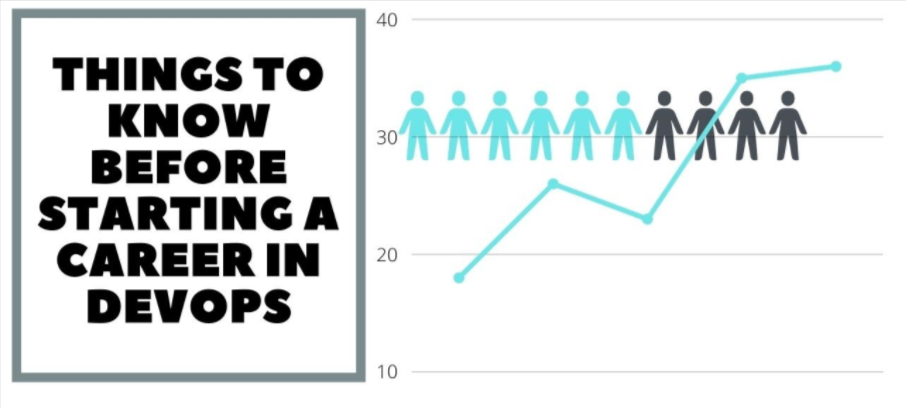Every professional who has advanced in his/her own career has definitely regretted not getting sufficient information about the domain they are going to enter, because if they knew they could have performed much better. So, for all the aspiring candidates (fresher as well working professionals) who wish to break into DevOps Domain, here is a guide for you that outlines seven things to know before starting a career in DevOps.
Clarity precedes career goals.
The first important thing that you must understand before stepping into the DevOps domain is that clarity overwhelms other aspects. You must be aware of what DevOps is and what it is not. Because DevOps is a cultural shift rather than just a makeover or a rebranding of Software Development Lifecycle (SDLC). DevOps stresses more on collaboration and communication.
In this culture shift, every stakeholder is involved in the process of developing and deploying applications and software. You can assume DevOps to be more inclined towards automation, so that means DevOps is a way to speed up the software development process and cycle to bring the product much quickly to the market. Hence, a DevOps course becomes equally vital to embrace and adopt these principles and practises.
Background knowledge required for DevOps Career paths
DevOps is a conjunction between the development team and the operations team. So, an expert in DevOps must be able to understand and comprehend both the Development and Operation side of things for a successful career. If you are a working professional having years of technical experience working in the relevant field, then you might have some idea about DevOps career paths. But if you are a fresher or a beginner in the domain, then you must be aware of the job roles within the domain before starting out.
Allow me to state three different roles of DevOps professionals in modern organizations:
- DevOps Engineers with a development background, find Software Development for building applications more suitable to them based on their background.
- DevOps Engineers with an operations background, find System Administrator or System Engineer more suitable to their work profile.
- Or else you can become a Site Reliability Engineer (SRE). SREs work similarly as Software Engineers for fixing issues in operations or infrastructure parts.
Be aware of the Technologies that you must learn
You must be aware of the technologies that you must learn for a successful career in DevOps. There are many software that you must specialize in as part of your job requirements. If you are aspiring for a career in the DevOps domain, you must start learning technology software for various requirements.
You must be proficient in Operating Systems, Cloud, Scripting & Programming languages, and Container technology. OS is the most fundamental software that every DevOps aspirant must learn. Learn Linux because you will be using it every day. Choose a scripting language of your choice like Python, Bash, Java, PowerShell, Go, C++, Ruby, C, etc. For Cloud Computing you can learn AWS, Azure, or GCP. Then have sound knowledge in Container Technology, by learning Docker and Kubernetes for performing Container orchestration. For other DevOps aspects, you can learn Chef or Puppet. And GitHub or Jenkins for Continuous Integration and Continuous Delivery (CI/CD) applications.
Learn more on Tutorial on DevOps in this Youtube Video:
Get certified in DevOps
This is the best way to kick-start your journey in the DevOps or associated domain, is to get yourself certified from a recognized training institute or an online training partner. Take a look at the best DevOps Course offered by Intellipaat that features instructor-led training and dedicated time for projects and assignments. Always look for the training or course that will help you gain industrial exposure.
Aim for acquiring more practical experience
You must keep learning and invest in practical exposure rather than theoretical training. Just enrolling in a course on DevOps from a recognized training partner wouldn’t mean that you will get a good job. You need to keep learning more and show your practical experience because only then will companies be satisfied by your profile. You can do projects to gain experience and advance your skills by learning beyond your job role. For example, a System Administrator must learn scripting languages to make a career transition to DevOps. Likewise for other career paths.
Invest your time in learning Automation
DevOps without automation isn’t DevOps! The soul of DevOps lies in Automation. If you are aspiring to make a career in DevOps, no matter whether you are a beginner or a working professional, you must be willing to invest more time in learning Automation. You must be capable of implementing automation tools to handle servers and deployments. There are many Automation tools that are available, which one to learn and invest time in it, varies with each company. Always keep learning more about Automation and the associated processes.
Build Rapport with the team and be curious to learn
DevOps is all about collaboration and communication. This level of transparency brings speed to the Software Development Lifecycle or Release cycle. Each domain in the IT industry plays a part in the bigger picture of the economy. DevOps is one such domain where you need to show more of a team player, one who builds a connection with each one of them in the team. So, you must enhance your soft skills, like good communication, build rapport with team members, problem-solving, curious and keen to learn new stuff that will help you bring a new change to what you do while in the job.


